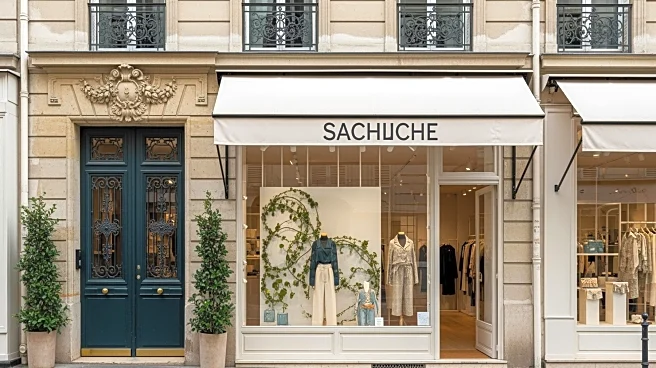What's Happening?
Californian fashion brand Reformation is set to open its first boutique in France and continental Europe on November 6, located in the Marais district of Paris. Known for its sustainable approach to fashion,
Reformation began in 2009 by selling vintage pieces in Los Angeles before launching its own collections. The Parisian store will feature a chic design with Murano glass light fixtures, hand-knotted rugs, and a wrought iron staircase. It will also incorporate Retail X, a high-tech retail concept that merges e-commerce with physical shopping experiences. This expansion is part of Reformation's broader strategy, which includes over 60 stores across the US, UK, and Canada. The brand plans to open a second Parisian boutique in 2026.
Why It's Important?
Reformation's expansion into Paris marks a significant step in its global growth strategy, highlighting the increasing demand for sustainable fashion. By entering the European market, the brand is poised to tap into a new customer base that values environmentally and socially responsible fashion. This move could influence other fashion brands to adopt similar sustainable practices, potentially reshaping industry standards. The integration of Retail X also reflects a growing trend towards blending online and offline shopping experiences, which could set a precedent for future retail innovations.
What's Next?
Reformation's entry into the Parisian market may prompt reactions from local and international fashion brands, potentially leading to increased competition in the sustainable fashion sector. The brand's success in Paris could encourage further European expansion, possibly influencing its supply chain and production strategies. Stakeholders, including investors and consumers, will likely monitor the brand's performance closely to assess the viability of sustainable fashion in new markets.
Beyond the Headlines
The opening of Reformation's Parisian boutique underscores a broader cultural shift towards sustainability in fashion. As consumers become more environmentally conscious, brands like Reformation that prioritize ethical production may gain a competitive edge. This trend could lead to increased transparency in supply chains and a reevaluation of fast fashion practices, ultimately fostering a more sustainable industry.









